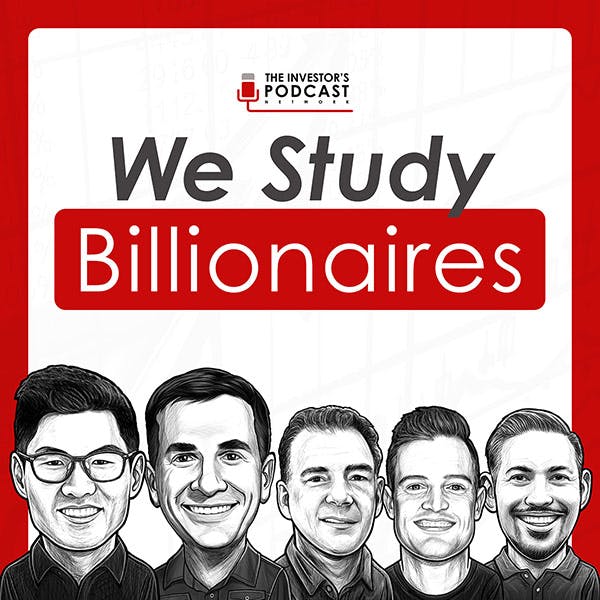
July 3, 2024 • 1hr 12min
BTC189: Prince Philip of Serbia on Bitcoin (Bitcoin Podcast)
We Study Billionaires - The Investor’s Podcast Network

Key Takeaways
- Prince Philip's journey to Bitcoin: From first hearing about it in 2011 to becoming a passionate advocate and "Bitcoin maximalist" by 2021
- Bitcoin's potential: Offers financial sovereignty, fixes energy issues, improves politics, and restores property rights
- Monarchy and Bitcoin synergies: Both support strong private property rights and long-term thinking
- Energy and Bitcoin: Bitcoin mining can help stabilize electrical grids and incentivize development of cheap, clean energy sources
- Adoption challenges: Education and shifting mindsets are key, especially in cash-oriented societies like Serbia
- Political landscape: Growing recognition of Bitcoin's importance by political figures, but still early stages for most countries
- Personal perspective: Prince Philip sees advocating for Bitcoin as part of his role in shining a light on property rights and sound money
Introduction
In this episode of the Bitcoin Fundamentals podcast, host Preston Pysh interviews Prince Philip of Serbia, a passionate Bitcoin advocate with a background in finance. The conversation covers Prince Philip's journey into Bitcoin, his views on its potential for financial sovereignty, and the unique synergies he sees between Bitcoin and monarchy. They also explore his vision for Bitcoin adoption in Serbia and beyond, as well as the challenges and opportunities in the current global financial and political landscape.
Topics Discussed
Prince Philip's Journey to Bitcoin (01:56)
Prince Philip shares his path from first hearing about Bitcoin in 2011 to becoming a full-fledged advocate:
- Initially dismissed Bitcoin as "magic internet money" in 2011
- Bought some Bitcoin in 2017 on a friend's recommendation, but got distracted by other cryptocurrencies
- The COVID-19 pandemic in 2020 sparked deeper interest and research into Bitcoin
- Became a "Bitcoin maximalist" by 2021 after studying and seeing Bitcoin's resilience
Prince Philip emphasizes how the pandemic and resulting economic policies made him question the current financial system: "I remember just thinking to myself, what the h**l is going on over here? What's all this money printing that? What's all this stimulus happening?"
Benefits of Bitcoin for Financial Sovereignty (13:38)
The discussion touches on why Bitcoin is crucial for financial sovereignty:
- True ownership: Bitcoin offers indisputable ownership, unlike traditional assets
- Protection against confiscation: Prince Philip's family history of asset confiscation makes him appreciate Bitcoin's resistance to seizure
- Hedge against inflation: Bitcoin's fixed supply contrasts with unlimited fiat money printing
Prince Philip states: "When you buy bitcoin, you're buying something that is indisputably yours. When you're buying land, you could go back and you can argue with somebody that like two, three centuries ago, this land used to belong to x or that nation used to be here and blah, blah, blah. And you can bring all this sort of stuff up. But when it comes to bitcoin, no, the definition of private property, of rights and of what ownership, I should say, is much more clear."
Synergies Between Bitcoin and Monarchy (15:41)
Prince Philip draws parallels between Bitcoin and monarchy:
- Long-term thinking: Both encourage a lower time preference and focus on preserving wealth across generations
- Strong property rights: Monarchies historically provided better protection of private property
- Stability: Bitcoin and well-functioning monarchies can provide economic stability
He explains: "I think some princes out there, or royal families are in better, I say not better off, but they obviously have a little bit more comfort, a bit more luxury. They are part of the system. They have properties that they've been inherited, because that's how good royal family monarchies, how descendancy, how succession works is. You'd look after your property for your sons and all that."
Environmental Impact of Traditional Banking vs. Bitcoin (21:14)
The conversation shifts to energy and Bitcoin mining:
- Bitcoin mining incentivizes the development of cheap, clean energy sources
- Miners can help stabilize electrical grids by consuming excess energy and shutting down during peak demand
- Traditional banking systems have a large, often overlooked environmental footprint
Prince Philip argues: "Bitcoin fixes energy. Bitcoin is an energy backed money. So bitcoin miners are looking for the cheapest form of energy that is good for civilization."
Steps for Bitcoin Adoption in Serbia (32:08)
Prince Philip discusses the challenges and opportunities for Bitcoin adoption in Serbia:
- Serbia's cash-oriented culture makes Bitcoin adoption challenging
- Education is key to overcoming misconceptions about Bitcoin
- Leveraging Serbia's technical talent could accelerate adoption
He notes: "Being a bitcoiner in Serbia is not easy. I think Serbia has a lot to offer bitcoin and bitcoin has a lot to offer to Serbia. Yeah, we have a lot of technical minds here, a lot of quantitative minds here, which is great. But the current sentiment here is that there's very cash orientated cash. Cash is king."
Vision for a Bitcoin Nation-State (34:23)
The discussion explores the potential for countries to adopt Bitcoin:
- El Salvador's adoption of Bitcoin as legal tender is a pioneering example
- Other countries may follow suit, especially after seeing economic benefits
- Political figures increasingly recognizing Bitcoin's importance
Prince Philip predicts: "I think that bitcoin is going to be on candidates' platforms in the next ten years. You're going to have on average, about two election cycles across the world. And you'll see by the second election cycle, I think bitcoin is going to appear in a lot of on their platforms."
Role of Merchants in Driving Bitcoin Adoption (36:08)
The importance of merchant adoption for Bitcoin's growth is discussed:
- Merchants accepting Bitcoin can help drive everyday use
- Point-of-sale systems and user-friendly wallets are crucial for merchant adoption
- Education for both merchants and consumers is necessary
Personal Anecdotes from Prince Philip's Life (39:51)
Prince Philip shares personal stories and reflections:
- His family's history of asset confiscation under communism
- The challenges and opportunities of being a prince in the modern world
- Using his platform to advocate for Bitcoin and property rights
He reflects: "I think that's what the good thing and bad thing about being a prince is in my position. That's me and Philip as being a prince that I was born with, essentially. Not that, okay, I was born in the United States. I don't know if people know this. My family not too wealthy, but they had. We went to decent schools and all that and they gave us a decent life."
Conclusion
Prince Philip of Serbia offers a unique perspective on Bitcoin, blending his royal background with a passion for financial sovereignty and sound money. His journey from skepticism to advocacy mirrors many in the Bitcoin community, while his position allows him to potentially influence adoption at higher levels.
The conversation highlights the potential of Bitcoin to address issues beyond just finance, including energy policy, property rights, and political systems. Prince Philip's vision of Bitcoin as a tool for restoring sound money principles and long-term thinking aligns with his understanding of the historical role of monarchy.
While challenges remain, particularly in education and shifting cultural mindsets, Prince Philip sees growing recognition of Bitcoin's importance among political figures and predicts it will become an increasingly important topic in global politics. His personal story and commitment to advocating for Bitcoin demonstrate the diverse backgrounds and motivations of those drawn to the cryptocurrency.
As Bitcoin continues to gain traction globally, voices like Prince Philip's may play a crucial role in bridging traditional institutions with this revolutionary technology, potentially accelerating its adoption and impact on the world stage.









